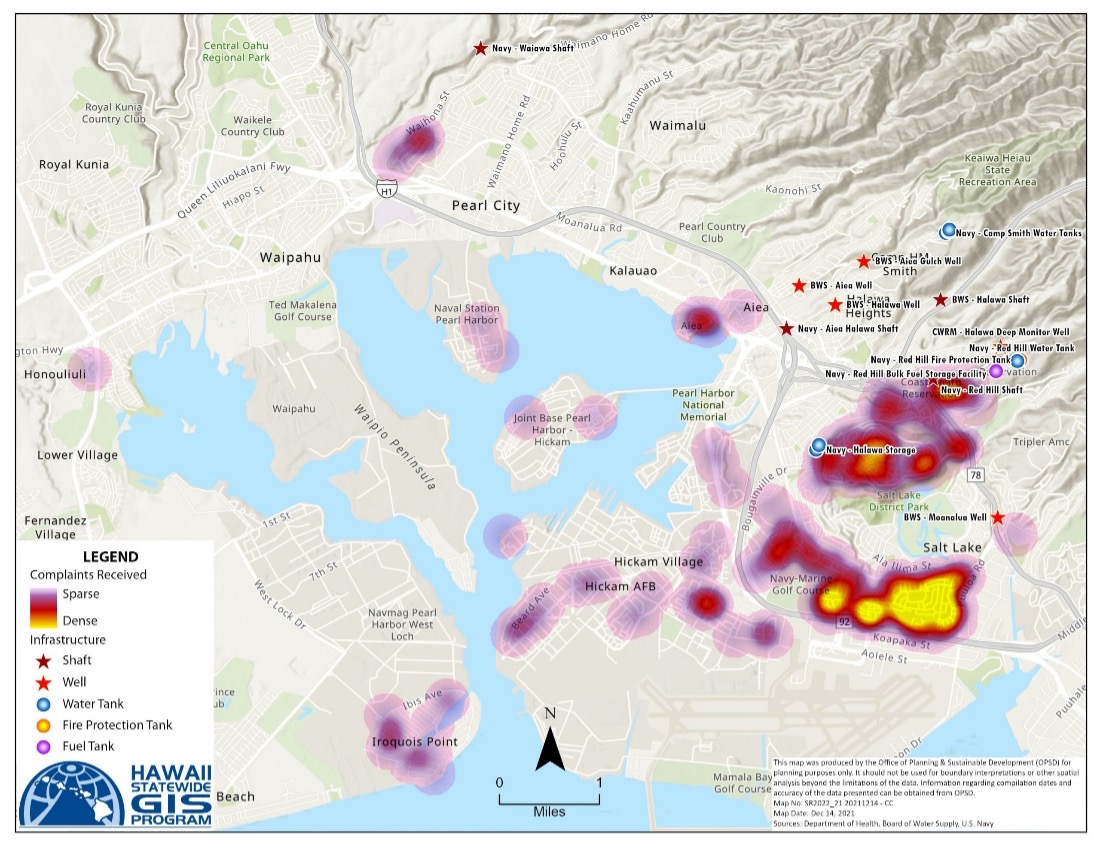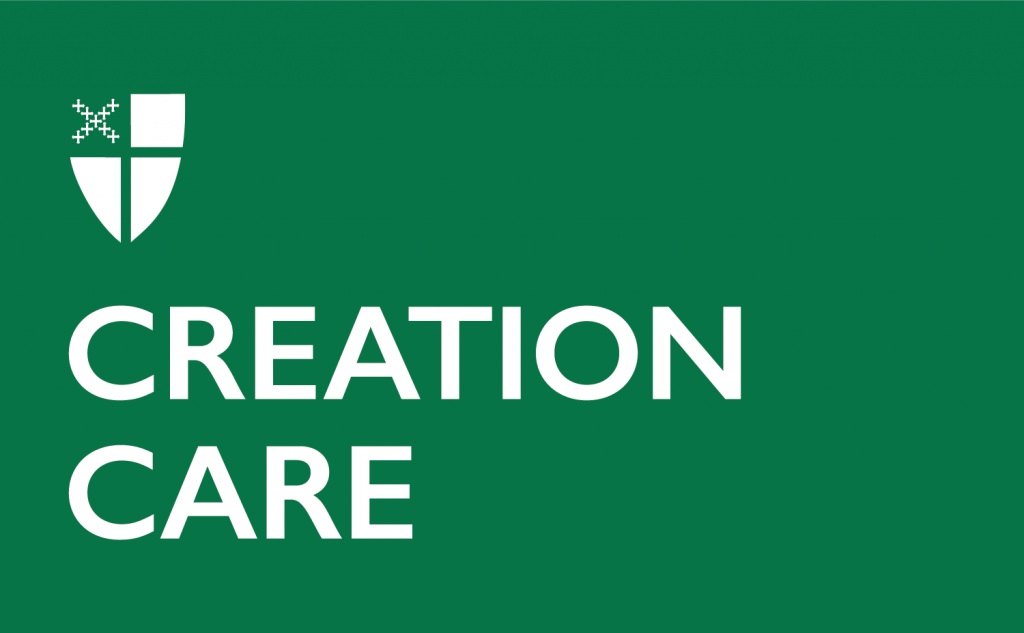Ola I Ka Wai – Water Is Life: The Red Hill Crisis Threatens Pristine Water Source
By the Rev. Jenn Latham, in conversation with the Rev. Kaleo Patterson

Living in the islands and on Oahu for the last four years has been a transformative experience for me–deepening my faith in our Creator God—as I co-chair the Episcopal Creation Care and Environmental Justice Task Force on Oahu. The ministry of creation care requires both curiosity about place and local systems, as well as a bold prophetic presence in communities and local government. It also must see into the future to recognize impacts that cannot be reversed and impacts that bring destruction to the land and the ecosystems.
I have been blessed with friends and colleagues who share their knowledge and wisdom about this place I now call home. One friend has shared stories of the ecosystems of the island, and I have developed an appreciation for the precious aquifer on the island of Oahu. I’ve learned that the aquifers on each island have some of the most pristine and pure water in the world, and it takes 25 years for rainfall to make its way into the system.
It was a shock for me to learn in December 2021 that a large system of tanks for jet fuel that the U.S. Navy built during World War II sits only 100 feet above this “most pristine water.” How could the Navy have done this? And how is it possible that long ago they didnʻt move the fuel to a safer location? Over the course of several spills, more than 60,000 gallons of jet fuel has leaked from the Red Hill Bulk Fuel Storage Facility from 2014-2021. The latest leak found its way into a well that supplies drinking water for residents.

The contamination impacted 93,000 people, many of whom were displaced; and, after returning to their homes, doubt whether their water will ever be safe to use. Residents are still suffering from the long-term effects of ingesting and bathing in the poisoned water. The Board of Water Supply and others had been warning the Navy for a long time about the disaster-in-waiting, an existential crisis to the residents of Oahu and all the living things on the land and in the sea that depend on the aquifer.
A fellow priest and colleague, Kaleo Patterson, has taught me that “Hawaiians consider the water as heaven sent, and living, and it is not an accident that the Hawaiian word for wealth or something of great value is a reduplication of the word for water—’waiwai.’”
For a long time, much Christian theology has taught that we humans are separate from the other non-human parts of Godʻs creation. We have heard Godʻs command of stewardship for Earth as dominion over rather than collaboration with the rest of Godʻs masterpiece.
This event has also shown me that I have much to learn about the militaryʻs impact in Hawaii. Kaleo has helped me understand how the U.S. military has disregarded the environmental impacts to these islands and also throughout the Pacific. I have learned that many islands have been used for military drills (some nuclear) that destroy the land, natural habitats of animals, and affect communities long-term with poisons left behind. The argument for this, of course, has to do with U.S. national security; and since the days of the overthrow of Queen Liliuokalani, Hawaii has been a land that the U.S. has occupied for economic and geopolitically strategic reasons. This all happened rapidly and neglected what was beneficial to the environment or the people of this place.
My faith is sustained through my engagement with the world around me, especially the wild world. More than any other place Iʻve lived, this island brings God close so often: in the wind blowing through the palms, in the delicate ferns growing along a cliff, in the way the fresh water running into the sea creates a perfect ecosystem for diverse animal and plant life. To imagine these signs of the “closeness-of-God” damaged beyond repair hurts my heart.
After all these learnings, I found myself in despair for the wai (water) and those who were suffering. As I prayed for Godʻs help, I knew that I wasnʻt alone. I quickly saw a community come together to mobilize into action. Kaleo reminded me that the spirit of God is always present in the land and the people to bring about healing and cleansing.
He also reminded me of the story of Elisha, who, after Elijah was taken away in a chariot of fire, came upon a place that had polluted, unclean, and contaminated water; the land had become useless and sick. Elisha asked for a new bowl and salt, and he went and cleansed and healed the water and the land with both his prayers and ritual use of a new bowl and the scattering of salt. Kaleo reminded me that we must be like Elisha and take responsibility to protect and care for the land and all of creation.
Jesus said we are the salt of the earth, and the light on the hill. These things we must be in the midst of the chaos of the world and the terrible disregard of God’s creations, and the pristine waters of life that are sacred. I am so grateful for Kaleoʻs words of wisdom and encouragement for active work toward healing.
Last July at the 80th General Convention, I was encouraged by the statement passed by the House of Bishops titled. “Expressing the Mind of the House on Climate and Our Vocation in Christ.” As I reflect on it today, I find its message encouraging for those who fight to “Shut Down Red Hill” (https://oahuwaterprotectors.org/). The bishops say: “We depend on God’s creation to sustain our life together, and, by serving as good stewards of creation, we reflect God’s tender love for all that has been made.” As people of faith we profess Godʻs love for the world, look with hope for a new way to be present in the world, and then take action toward that vision.
The future we envision for this place does not include leaking fuel tanks. Rather, we seek a restored ecosystem in which all of nature is safe from human harm; we see people and animals able to drink and bathe in water without fear; and we imagine the resources of Hawaii to be protected for and restored to the descendants of people who have lived here for more than 1,000 years.
What action can I do that brings us to this envisioned future? As a priest, telling the story and joining with others to make that story heard is what I can do. Reminding us all that God calls us to love what God has created is my vocation. During the past year, many people have made their voices heard at sign-waving events, in public comments, written testimonies, and on social media. We are telling the story, and we hope people will listen. Though the tanks were ordered closed in March of 2022, little progress has been made to remove the fuel. This story is not front-page news anywhere else.
To bring attention to the crisis, our diocesan task force for Creation Care and Environmental Justice has joined hands with Hawaii Interfaith Power and Light to urge a national letter-writing campaign. We are asking all people of faith to join us in writing letters to President Joe Biden and Secretary of Defense Lloyd Austin, to urge them to declare this crisis “mission critical and an emergency.” We are asking you and your church to write letters; we are asking whoever loves clean water to write letters. Join us using the link above. Please help us preserve the evidence of Godʻs love for the world that this pristine water represents. Please help the people and other creatures of Oahu live on this beautiful island for another millennium.
Jennifer Briggs Latham (aka Rev. Jenn) serves as assisting priest at Holy Nativity Church in Honolulu and co-chairs the Creation Care and Environmental Justice Task Force for The Episcopal Church in Hawaii.
The Rev. Kaleo Patterson, who holds a doctorate in ministry, serves on the Native Hawaiian Advisory Council for the Army to review Army projects and programs for cultural, historic, and environmental resources. On Kauai he led a protest at the Pacific Missile Range Facility against the proposed STARS Missile Defense Program, which was shut down after two years startup. He also helped host clergy on visits to Kahoolawe to learn about the Navy’s bombing of the island. He is vicar of St. Stephenʻs Episcopal Church in Wahiawa on the island of Oahu.

